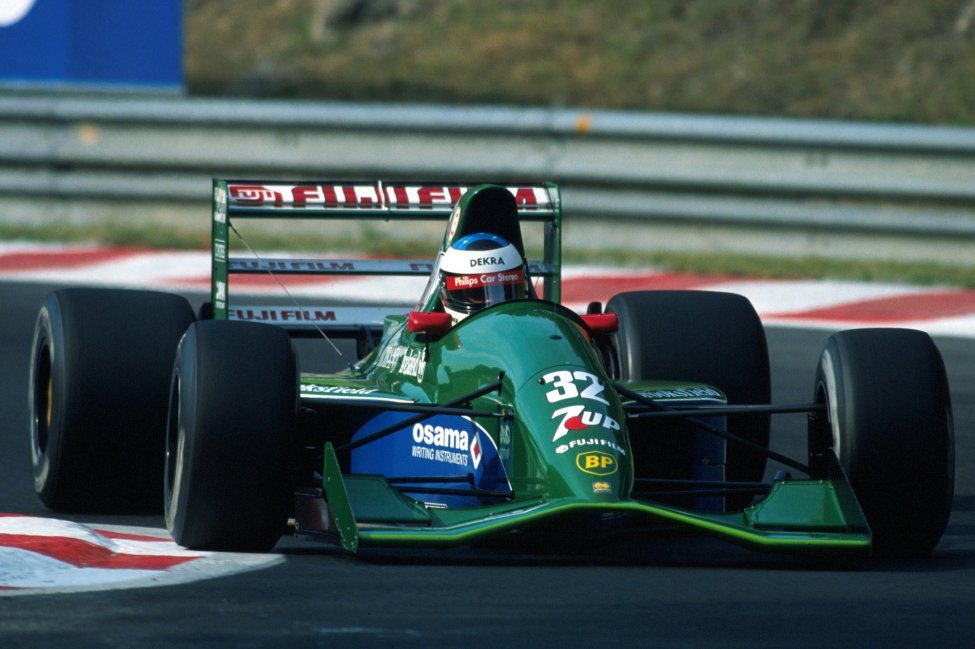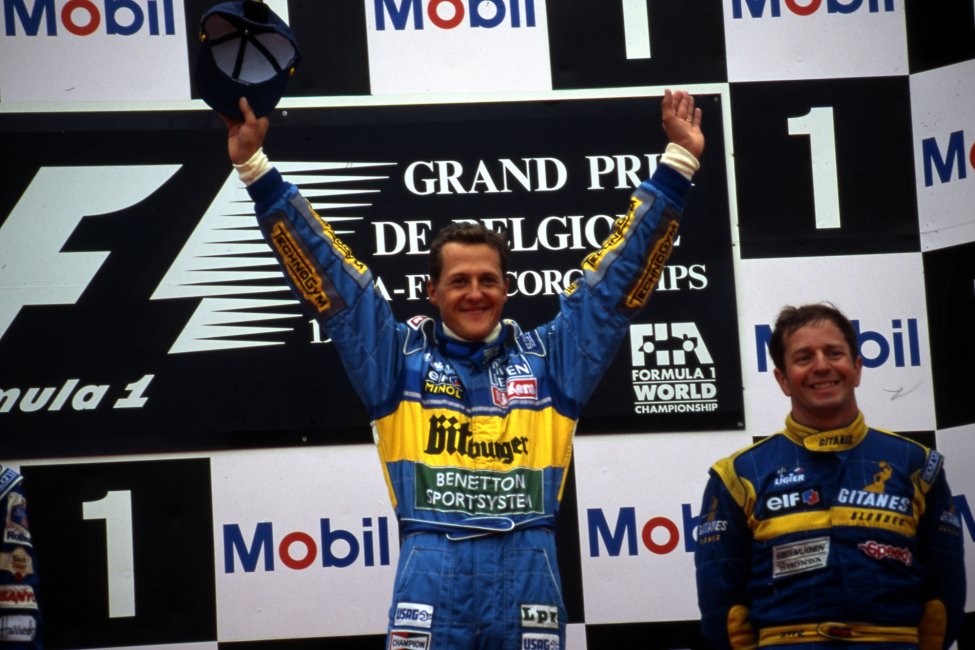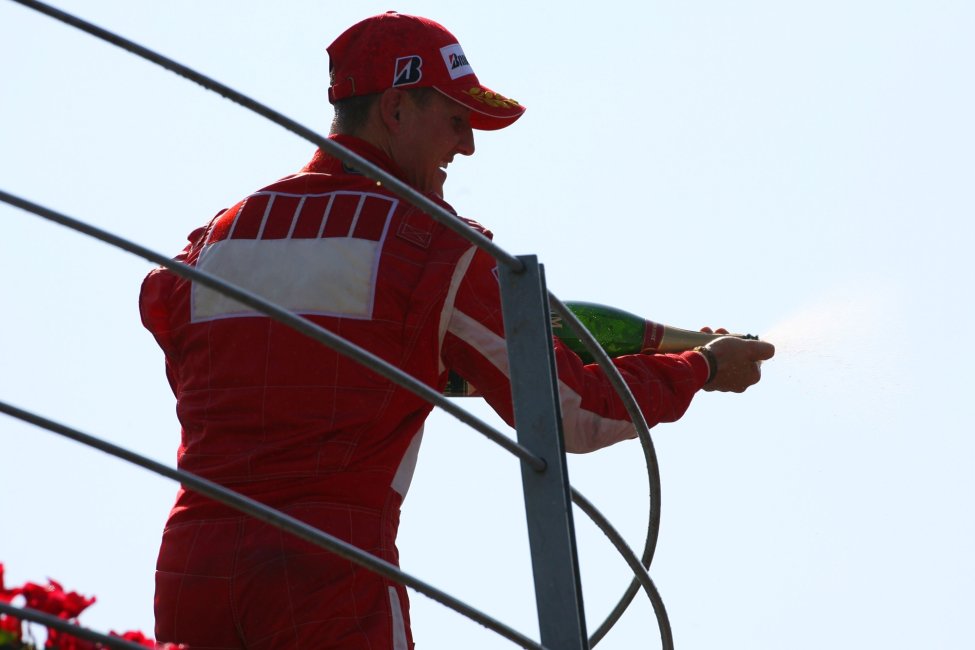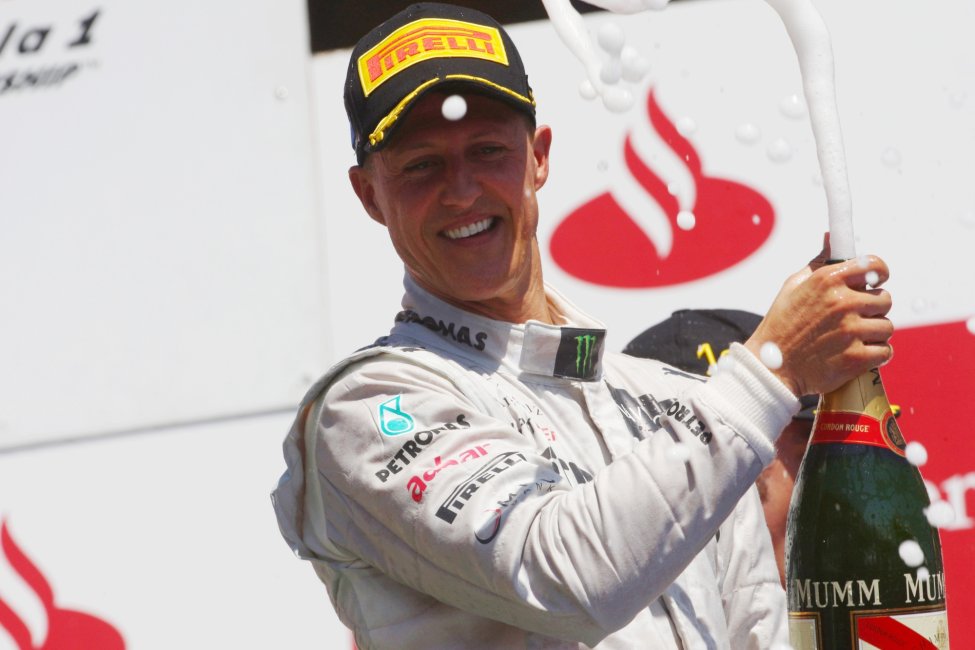Michael Schumacher
- Team
- Nationality
-
 German
German
- Date of birth
- 3 Jan 1969
- Active
- 1991 - 2012
Arguably the greatest F1 driver in history, Michael Schumacher made a lasting impact on the sport that continues to be felt today. The German defined excellence during the course of his exceptional career, winning a joint-record seven world championships to go along with 91 victories and 68 pole positions.
Michael Schumacher profile
- Full name
- Michael Schumacher
- Current team
- Date of birth
- 03 January 1969
- Place of birth
-
Hürth, Germany
- Nationality
-
 German
German
- Debut race
-
 Belgian GP 1991
Belgian GP 1991
- Last race
-
 Brazilian GP 2012
Brazilian GP 2012
Career of Michael Schumacher
-
F1 years
- 19
- Best race result
- 1
- Number of Grands Prix won
- 308
- Number of sprint races
- 0
- Sprint wins
- 0 / 0
- 0%
- WC points
- 1566
-
Victories
- 91
- 29.5%
- Wins from pole
- 40 / 68
- 58.8%
- Hat-tricks
- 7
- Grand Slams
- 2
- Most wins in a season
- 13
- Win streak
- 7
-
Podium finishes
- 155
- 50.3%
- P1 finishes
- 91 / 155
- 58.7%
- P2 finishes
- 43 / 155
- 27.7%
- P3 finishes
- 21 / 155
- 13.5%
- Most podiums in a season
- 17
- Podium streak
- 19
Biography of Formula 1 legend Michael Schumacher
Michael Schumacher was born in Hurth, North Rhine-Westphalia in Germany on January 3, 1969 to Rolf and wife Elisabeth. When Michael was four his father modified his pedal kart by adding a small motorcycle engine, effectively kicking off his motor racing career.
Young Michael crashed it into a lamp post in Kerpen, prompting his parents to take him to the karting track at Kerpen-Horrem where he became the youngest member. From there his father built him a kart using discarded parts and Michael soon won his first club championship at the age of six. To help with his son's racing, Rolf took a second job renting and repairing karts while his wife worked at the track's canteen.
After initially getting his kart license in Luxembourg at the age of 12 - due to regulations in Germany requiring a driver be 14 - Schumacher finally got his German license in 1983 a year after winning the German Junior Kart Championship. From there Schumacher won several German and European titles before making his way into single-seat racing in 1988 by participating in the German Formula Ford and Formula Konig series.
In 1989, Schumacher signed with Willi Weber WTS Formula Three team, winning the German Formula 3 series in 1990. He won the Macau Grand Prix that year, finishing ahead of Mika Hakkinen despite the two coming together in the second heat which resulted in the German finishing without a rear wing.
From there Schumacher joined the Mercedes junior racing programme in the World Sports-Prototype Championship along with Formula 3 rivals Heinz-Herald Frentzen and Karl Wendlinger. The move was viewed by many as an odd choice as most contemporaries chose to compete in Formula 3000 on the way to F1, but Weber believed that the exposure to professional press conferences and long-distance races with powerful cars would help Schumacher's career.
Schumacher’s Formula 1 debut with Jordan
Schumacher made his F1 debut at the 1991 Belgian GP for Jordan-Ford as a replacement for the imprisoned Bertrand Gachot. Still contracted to Mercedes, the German manufacturer paid Jordan $150,000 for his debut.
The move came after Schumacher impressed members of the Jordan team during a test drive at Silverstone the week before. Weber assured Jordan that Schumacher knew the Spa-Francorchamps track well, though the truth was the German had only ever been there as a spectator. The German learned the track by cycling around on his fold-up bike.
He qualified seventh - matching the team's season-best grid position - though his race ended on the opening lap due to clutch problems.
Although Jordan and the Mercedes management had an agreement in place that would see Schumacher drive for the Irish team for the remainder of the season, the German joined Benetton-Ford for the following race in Italy. Jordan tried to file an injunction to prevent the move, but lost the case as a final contract hadn't been signed.
Schumacher finished fifth in Italy ahead of teammate and three-time World Champion Nelson Piquet. He ended the year with four points from six races.
While the 1992 season was dominated by the Williams of Nigel Mansell and Riccardo Patrese, Schumacher managed to score his first podium by finishing third at the Mexican GP. His first victory came later that year at the wet Belgian GP, and he finished third in the standings with 53 points, behind the Williams duo.
Williams was once again the team to beat the following year, this time with drivers Alain Prost and Damon Hill. The Frenchman took the title but Schumacher managed to win the Portuguese GP - finishing on the podium nine times across the year to finish fourth with 52 points.
First World Championships with Benetton
The 1994 season saw Schumacher wins six of the first seven races. He led the Spanish GP, only for a gearbox failure to leave him stuck in fifth, though he managed to finish second.
Following the San Marino GP, Benetton, Ferrari and McLaren were investigated on suspicion of breaking the FIA's ban on electronic aids. Benetton and McLaren initially refused to hand over their source code, and when they did the FIA found hidden functionality in the software. Given there was no evidence it had been used in race both teams were fined $100,000 for failing to cooperate. However, McLaren's software was deemed legal, while Benetton's was deemed to be a form of launch control.
Schumacher was penalised for overtaking on the formation lap of the British GP, though he ignored the penalty and was later handed a black flag. This resulted in a disqualification and two-race ban that Benetton blamed on a communication error with the stewards. He was later disqualified from the Belgian GP for illegal wear on his skid block.
These incidents allowed Hill to close the gap in the standings, with Schumacher leading by one point heading into the final race in Australia. The championship was decided on Lap 36 when Schumacher hit the wall while leading.
Hill tried to pass, but the two collided as the German looked to rejoin the track resulting in a collision that forced both drivers to retire. As a result, Schumacher became the first German champion in F1 history.
Powered by the same Renault engines used by Williams, Schumacher successfully defended his title with Benetton in 1995.
The German won nine of the 17 races and finished on the podium 11 times, finishing 33 points ahead of Hill despite being knocked out of the British and Italian GP by the Briton. Schumchaer's performances, along with those of teammate Johnny Herbert, helped Benetton claim its first Constructors' Championship.
Move to Ferrari
Schumacher joined Ferrari ahead of the 1996 F1 season as the Scuderia looked to end its championship drought having last won the Drivers' and Constructors' titles in 1979 and 1983 respectively.
While the team had come close to titles in 1982 and 1990, it struggled in the early 1990s as the V12 engine it used proved no match against the more fuel-efficient V10s used by competitors.
Joining the German at Ferrari was Eddie Irvine, who moved from Jordan. Although Schumacher declared in testing that the 412T was good enough to win the championship, the team wasn't viewed as being on the same level as Williams and Benetton.
While the championship proved to be out of reach in 1996 that didn't stop Schumacher from recording three wins, a figure that eclipsed Ferrari's tally from 1991 to 1995. The German retired from three of the first six races, but a legendary performance at the Spanish GP saw Schumacher take his first win for the team in difficult conditions.
He navigated the torrential rain and lapped the entire field up to third place, consistently lapping almost five seconds faster than his competitors to add to his "Rainmaster" ("Regenmeister") nickname.
The low point of the season came in France when Schumacher took pole, only to suffer an engine failure on the formation lap. Nevertheless, he took two more victories in Belgium and in front of Ferrari's famous Tifosi at the Italian GP to give the Scuderia its first victory at Monza since 1988.
The German ended the year third in the standings while Ferrari finished behind Williams in the Constructors' Championship.
Schumacher battled it out with Williams' Jacques Villeneuve for the title in 1997. Although the Canadian started the year strongly, the German responded and claimed five wins which allowed him to enter the final race of the season with a one-point lead.
However with Schumacher under pressure from Villeneuve while leading the European GP, the German developed a coolant leak which resulted in the Williams driver closing the gap.
Villeneuve tried to pass the Ferrari driver, however, Schumacher turned into his rival to try and maintain his advantage. The then-two-time champion retired while Villeneuve scored four points to take the title. Schumacher was later punished for his unsportsmanlike behaviour and disqualified from the Drivers' Championship.
Mika Hakkinen was Schumacher's rival for the 1998 season, with the McLaren driver winning the opening two races of the season. The German responded with a win in Argentina and a trio of wins in Canada, France and Britain. The latter was controversial as Schumacher led on the final lap and stopped for a 10-second stop-go penalty after crossing the finish line.
The Belgian GP saw Schumacher jump out to a 40-second lead in rainy conditions, however, he crashed into the back of David Coulthard while trying to lap the McLaren driver. Both drivers retired, but things didn't end there as Schumacher headed to the McLaren garage and accused Coulthard of trying to kill him.
The German's title challenge came up just short as he finished 14 points back from Hakkinen after retiring from the Japanese GP, while Ferrari finished 23 points back from McLaren.
While Schumacher helped Ferrari to the Constructors' Championship in 1999, his hopes of claiming individual glory were dashed after crashing out at the British GP. The German suffered a rear brake failure and crashed into the barriers at Stowe Corner, resulting in a broken leg. Schumacher returned after missing six races to help teammate Irvine in his bid for the Drivers' Championship, however, Hakkinen took his second consecutive title.
Schumacher ends Ferrari drought
Schumacher and Hakkinen battled it out in 2000, with the Ferrari driver winning five of the first eight races, however the McLaren driver responded midway through the year.
The championship battle came down to the penultimate race of the season with Schumacher starting on pole, though he lost out to Hakkinen off the line. However, the German got ahead of his championship rival after the second pit-stops, coming out ahead to take his third Drivers' Championship and Ferrari's first since 1979. The Scuderia also took the Constructors' Championship, finishing 18 points up on McLaren.
There was no stopping Schumacher in 2001 as the German won nine of the 17 races to take the title with four races to spare. Standout moments included the Canadian GP where Schumacher finished second to brother Ralf, making it the first one-two finish by brothers in F1.
Michael's win at the Belgian GP was the 52nd of his career, moving him past four-time World Champion Alain Prost. All in all, Schumacher finished with 123 points, 58 ahead of nearest rival Coulthard, while Ferrari took the Constructors' Championship by finishing 77 points up on McLaren.
Schumacher and Ferrari dominated again in 2002 as the German and teammate Rubens Barrichello won 15 of the 17 races. The German cruised to his fifth title by clinching with six races remaining, however, the season had its fair share of controversy. Barrichello led the Austrian GP only to let Schumacher by with metres remaining due to team orders which resulted in loud boos from the crowd. The German tried to create a formation finish with his teammate at the US GP, however, Schumacher slowed too much which let Barrichello take the victory. Schumacher ended the year with 11 wins while finishing on the podium at every race, taking the title by 67 points over Barrichello as the pair finished one-two at nine of the 17 races.
Breaking Fangio's World Championship record
Unlike 2002, the 2003 season was tightly contested with McLaren and Williams both in the mix for the title. Schumacher started slowly and trailed Kimi Raikkonen by 16 points in the early stages, though he reduced the gap to just two by claiming three wins in a row in San Marino, Spain and Monaco.
Williams duo Ralf Schumacher and Juan Pablo Montoya each claimed two victories midway through the year as Michael led Raikkonen and the Colombian by one and two points respectively by Hungary. Schumacher needed just one point at the season-ending Japanese GP while Raikkonen needed a win, with the German finishing eighth to take his record-breaking sixth World Drivers' title.
There was no stopping Schumacher in 2004 as the German took 12 of the first 13 races of the season, with his only blemish coming at the Monaco GP after an accident with Montoya during the Safety Car. He clinched his seventh and final championship at the Belgian GP, ending the year with 13 wins from 18 events.
Decline and quick bounce back
Tyres had to last an entire race in 2005, giving the advantage to Michelin teams over those using Bridgestone like Ferrari.
Schumacher battled but the Scuderia was no longer dominant compared to previous years, with the German's best early season result coming at San Marino when he finished 0.2 seconds back of Fernando Alonso despite starting 13th.
His only victory came at the United States GP as the Michelin tyres were found to have a significant safety issue around the track. As a result all teams using the Michelin tyres retired on the formation lap, allowing Schumacher and Barrichello to finish one-two. Schumacher ended the year third with 62 points, fewer than half of World Champion Alonso.
The German bounced back in what proved to be his final year with Ferrari in 2006, though things started slowly as Schumacher found himself trailing Alonso by 17 points after three races. A high point of the season came at San Marino when the German recorded his 66th pole position, breaking Senna's previous record. He would have had another one in Monaco however he was stripped of pole after stopping his car and blocking part of the circuit while Alonso was on his qualifying lap.
Schumacher trailed the Spaniard by 25 points by the Canadian GP, however, that gap was cut to 11 after three wins in a row. A sparkling performance in China saw the German draw level with Alonso with two races remaining.
The Ferrari driver led the Japanese GP however with 16 laps to go he suffered an engine failure, his first since the 2000 French GP. Alonso went on to take victory meaning Schumacher could only take the title with a win and Alonso failing to score.
A fuel pressure problem meant the German started the Brazilian GP in 10th. After making his way up to sixth, Schumacher suffered a tyre puncture after passing Alonso's teammate Giancarlo Fisichella, dropping him all the way to 19th. Nevertheless, he battled back and finished fourth.
Retirement and near return
It was Schumacher's final race for Ferrari as the Scuderia had issued a press release during the podium ceremonies for the Italian GP stating he would retire at the end of the campaign.
The German attended several races during the 2007 season, acting as Ferrari's adviser and Jean Todt's 'super assistant', while also testing the car. He continued to test the Ferrari car in 2008, while also taking part in the IDM Superbike-series for Ducati.
Felipe Massa suffered a serious injury after being struck by a suspension spring during qualifying for the 2009 Hungarian GP. Once it became clear that Massa would miss some time, Ferrari picked Schumacher as his replacement however the move was called off due to the severity of a neck injury the German suffered in a motorcycle accident earlier in the year. As a result Luca Badoer and Fisichella filled in for the Brazilian instead.
Comeback with Mercedes
After spending three years away from the sport, Schumacher returned to F1 to join the Mercedes team alongside fellow German Nico Rosberg. The new outfit was Mercedes' first venture in an F1 team since 1955, with Schumacher stating that his preparations to replace Massa had sparked an interest to return to the grid.
The German finished the opening race of the season in Bahrain in sixth, while upgrades helped him finish fourth in Spain. Schumacher qualified fifth in Turkey and followed that up with a fourth-place finish in the race, but he finished the season ninth with 72 points with no wins, pole positions, podiums or fastest laps - the first time that had occurred since his debut season in 1991.
Schumacher finished the 2011 Canadian GP in fourth, while he battled back from a last-place start in Belgium to finish fifth. The German even led three laps at the Japanese GP, the first time he led a race since 2006 while also becoming the oldest driver to lead a race since Jack Brabham in 1970. He finished the year eighth with 76 points.
After scoring points in Malaysia, Schumacher started the Chinese GP alongside teammate Rosberg on the front row. However, he was forced to retire due to a loose wheel after an error during his pit stop. The German finished with the fastest qualifying time in Monaco but started sixth due to a five-place grid penalty picked up at the previous race in Spain.
Schumacher's only podium during his return to F1 came at the European GP, as his third-place finish made him the oldest driver to finish on the podium since Brabham at the 1970 British GP. From there he announced his second retirement from the sport, finishing seventh in his final race in Brazil. Schumacher finished the year 13th in the Drivers' Championship.
Michael Schumacher's skiing accident
One year after his retirement, Schumacher suffered a serious injury in a skiing accident. The accident occurred on December 29, 2013, in the French Alps. Schumacher was skiing in the Méribel ski resort when the accident happened.
According to official reports, Schumacher lost control of his skis and fell, hitting his head on a rock. Although he was wearing a helmet, the impact was still severe, resulting in a serious head injury. He was immediately transported to the hospital in Grenoble, France, where he underwent two surgeries to treat his brain and relieve pressure in his skull.
Michael Schumacher now
Schumacher was subsequently placed in an induced coma to promote his recovery. He remained in the hospital for several months before being released to his home in September 2014, where he continued to receive treatment and rehabilitation. Since then, little official information has been released about his condition, as his family has protected his privacy.
Don't miss out on any of the Formula 1 action thanks to this handy 2026 F1 calendar that can be easily loaded into your smartphone or PC.
Download the calender


